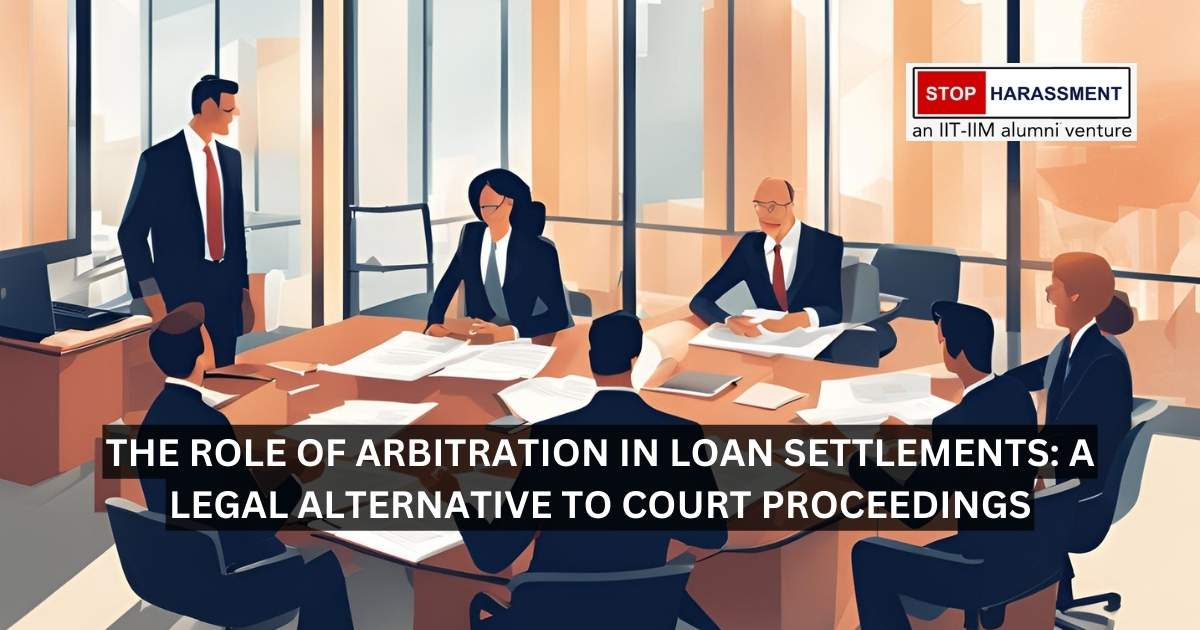· Finance · 5 min read
When to Initiate the Arbitration Clause in a Loan Dispute
Discover when to initiate the arbitration clause in a loan dispute, from failed negotiations to harassment by recovery agents. Learn how arbitration can provide a quicker, private, and fair resolution
.CQX6XYsF.jpg)
In the world of loans and credit, disputes between borrowers and lenders are not uncommon. These disputes can range from disagreements over repayment terms to issues arising from harassment by recovery agents. When such disputes escalate, borrowers often wonder what their options are to resolve the matter without spending years in court. This is where the arbitration clause in your loan agreement comes into play. But what is it, and when should you initiate it? Let’s break it down in simple terms.
Understanding the Arbitration Clause
An arbitration clause is a provision in your loan agreement that allows disputes to be resolved outside of court through arbitration. Arbitration is a process where a neutral third party, called an arbitrator, hears both sides and makes a binding decision. Think of it as a private judge for your case. Many loan agreements include this clause to provide a quicker, more efficient way to settle disputes.
When Should You Consider Arbitration?
Borrowers often hesitate to use the arbitration clause, either because they don’t understand it or because they don’t realize it can work in their favor. Here are some situations when initiating arbitration might be the right choice:
1. When Negotiations Fail
The first step in resolving any loan dispute should always be negotiation. You can try to speak directly with your lender, explain your situation, and work out a mutually agreeable solution. However, if these negotiations fail and your lender refuses to cooperate or insists on terms you can’t afford, arbitration can be the next step. It’s a formal way of resolving the issue without going to court.
2. When Recovery Agents Harass You
Borrowers often face harassment from recovery agents who use unethical practices like threatening calls, home visits, or public shaming. Such behavior is not only unethical but also illegal. If you’re being harassed despite communicating your willingness to resolve the matter, it’s a clear sign to initiate arbitration.
The arbitrator will hear your side of the story and can help address such grievances. You may even be entitled to compensation for the harassment you’ve faced.
3. When There’s a Dispute Over Loan Terms
Sometimes, borrowers and lenders interpret loan terms differently. For example, you might believe that you’ve cleared all your dues, but the lender claims you still owe money due to hidden charges or penalties. Such disputes can become complicated if left unresolved.
Arbitration allows a neutral party to review the terms of the agreement, analyze the evidence, and make a fair decision. This is especially helpful when the dispute revolves around technical or legal jargon that might not be easy to understand.
4. When You Want a Faster Resolution
Court cases in India can drag on for years. If you’re looking for a quicker resolution, arbitration is often a better option. Arbitrations are typically completed within a few months, saving you time, energy, and money.
5. When You Want Privacy
Unlike court proceedings, which are public, arbitration is a private process. If you’re worried about your financial disputes becoming public knowledge, arbitration offers a more discreet way to resolve the issue.
Steps to Initiate Arbitration
If you’ve decided to initiate the arbitration clause in your loan agreement, here’s what you need to do:
1. Review Your Loan Agreement
Carefully read through your loan agreement to locate the arbitration clause. It will usually mention the process, including how to appoint an arbitrator and which arbitration rules apply under the Arbitration and Conciliation Act, 1996.
2. Send a Notice to the Lender
Draft a formal notice informing the lender that you’re invoking the arbitration clause. Include details of the dispute, your efforts to resolve it, and your request to appoint an arbitrator. This notice can often prompt the lender to negotiate seriously before the matter escalates.
3. Appoint an Arbitrator
If your lender agrees to arbitration, both parties will appoint an arbitrator. Some agreements specify a pre-appointed arbitrator, while others allow each party to choose one arbitrator, with a third neutral arbitrator appointed if required.
4. Present Your Case
During the arbitration proceedings, present all relevant documents, emails, and evidence that support your case. Be honest and clear about your financial situation and the steps you’ve taken to resolve the dispute.
5. Arbitrator’s Decision
Once the arbitrator has heard both sides, they will issue a binding decision. This decision is enforceable under the law, meaning both you and the lender must comply with it.
Important Considerations
While arbitration is a useful tool, there are a few things to keep in mind:
Cost: While arbitration is generally cheaper than court, there are still costs involved, such as arbitrator fees. Make sure you understand these before initiating the process.
Binding Nature: Arbitration decisions are usually final but can be appealed in high courts.
Seek Legal Advice: It’s always a good idea to consult a lawyer who can guide you through the arbitration process and ensure your rights are protected.
Conclusion
The arbitration clause in your loan agreement is a powerful tool that can help you resolve disputes efficiently and fairly. Whether it’s due to failed negotiations, harassment, or disagreements over loan terms, arbitration provides an alternative to lengthy court battles. However, it’s important to approach the process with proper preparation and a clear understanding of your rights. If used wisely, arbitration can be a game-changer in settling loan disputes and helping you regain financial peace of mind.


 (Stopharassment) Chasing Dues the Right Way Understanding Legal Debt Recovery.CEsdngE0.jpg)
